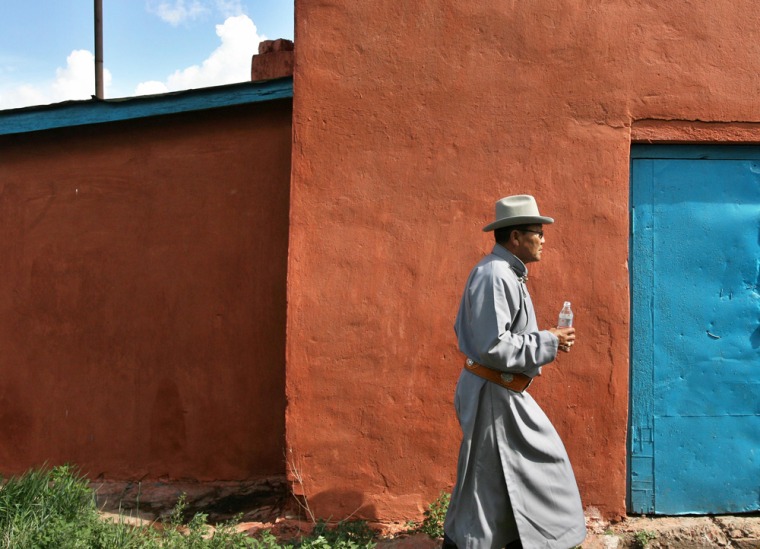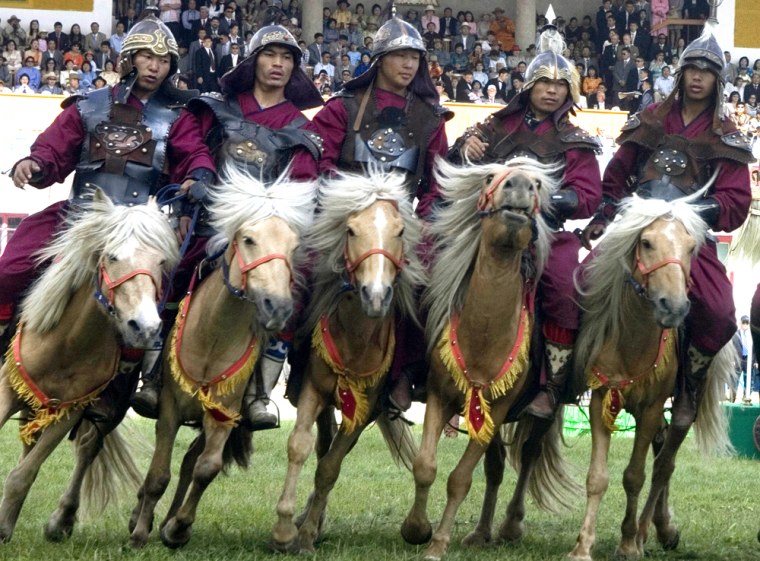Warriors from Genghis Khan’s 13th-century horde paraded on stout, brown horses, while women wore period costumes and horned helmets. The crowd held up cards to form pictures of the conqueror and the national flag.
Then Genghis Khan himself — an actor wearing a white robe and headgear — rode in on a white horse to shouts of “Hurray!” from the crowd.
Mongolia celebrated the 800th anniversary of Genghis Khan’s march to world conquest on Tuesday with festivities that mixed commercialism with appeals to nationalism.
Mongolians and their leaders are reveling in Genghis Khan, finding a source of identity at an unsettling time.
“We Mongolians must be united and have one goal: to develop our country. Remember Genghis Khan and his great deeds,” said President Nambaryn Enkhbayar, who usually wears a suit but was dressed in a traditional gold and cream silk robe for the occasion.
Greatness of Genghis
Sandwiched between a voracious China and an assertive Russia, Mongolia faces challenges abroad, while at home the democracy and free markets that followed communism’s collapse in 1990 have created wealth for some but left a third of the 2.8 million people in poverty.
The greatness of Genghis Khan is something that most Mongolians agree on.
“I feel so proud to have been born in the land of the Great Khan who conquered most of the world,” said Tserendulam, a recently retired cook who was among 800 singers at the ceremony. Like many Mongolians, he uses one name.
The anniversary marks Genghis Khan’s unification of fractious Mongol tribes in 1206 — an event that gave Mongolians a nascent national identity and set them on a course to forge an empire that stretched from the Pacific to Central Europe.
Though the celebrations will last a year, Tuesday’s ceremony was timed for maximum public impact: the start of an annual festival of horse racing, archery, wrestling and camaraderie known as Naadam.
It’s a time when the harsh weather of the steppe mellows for a brief summer, Mongolians enjoy themselves and politicians try to burnish their appeal.
Forefather of globalization?
Images of Genghis Khan, often as a wizened elder, have been plastered on billboards, etched in white stones on a mountainside and used to promote tourism. A rock opera of the conqueror’s life — modeled on “Jesus Christ Superstar” — is being staged by a popular band.

The government tore down mausoleums of a 20th-century nationalist hero and a communist dictator on Ulan Bator’s central square this year to build a $5 million monument of Genghis Khan in bronze.
At Tuesday’s ceremony, the president and audience sang a newly altered version of the national anthem. The revisions, made by the government in recent weeks, deleted references to the communist past and replaced them with allusions to Mongolian independence.
In the rush to capitalize on his name, Genghis Khan’s legacy as a brutal conqueror is being played down. Instead, he’s being cast as an agent of world change, a visionary statesman who promoted low taxes on trade, diplomatic immunity and religious tolerance.
“We are forefathers of globalization,” says one government slogan.
Opponents decry move
This marshaling of Genghis Khan’s legacy to promote national pride — and the money being spent — has prompted cries of waste and political manipulation from some in the elite.
Mongolian politics has grown divisive, with partisan bickering between Enkhbayar’s Mongolian People’s First Party, a successor to the old Communist Party, and a coalition of newer democratic parties.
The president’s “entourage is trying to create an image that by rallying around our leader we are recreating the glory of Mongolia in the 13th century,” said Munkh-Ochir Dorjjugder, an international affairs expert at a Defense Ministry think tank.
Enkhbayar, in his speech, appealed several times for unity. He and members of his political circle defended their use of Genghis Khan’s image as necessary given the challenges.
“As a small country sandwiched between large nations, globalization is felt day to day and it’s a pressing matter,” Tsend Munkh-Orgil, a member of Mongolia’s parliament and Enkhbayar’s party, told reporters Monday. He said Genghis Khan can help forge “the national unity and national consensus” missing since democracy and capitalism emerged 15 years ago.
“Our ancestor 800 years ago not only brought war and destruction, but he also brought liberation and freedom,” said Munkh-Orgil, who has a degree from Harvard Law School. “As to the methods, it was the 13th century. What could we say?”
